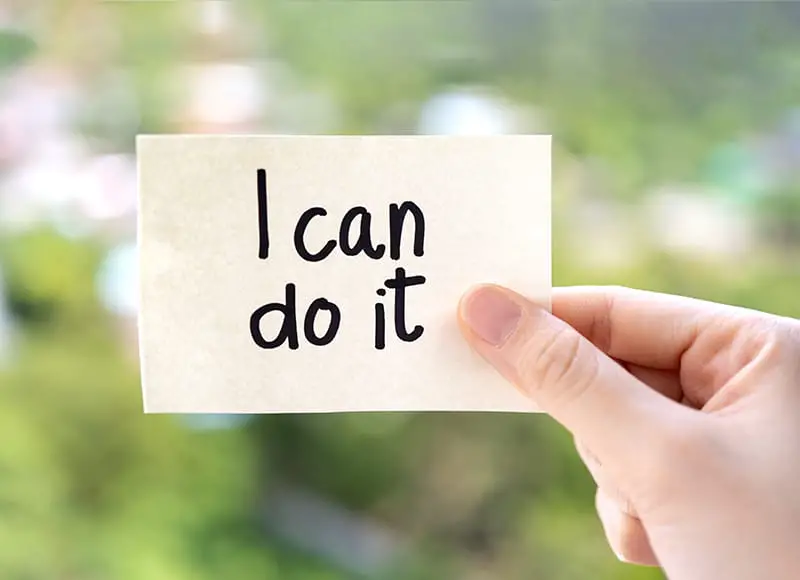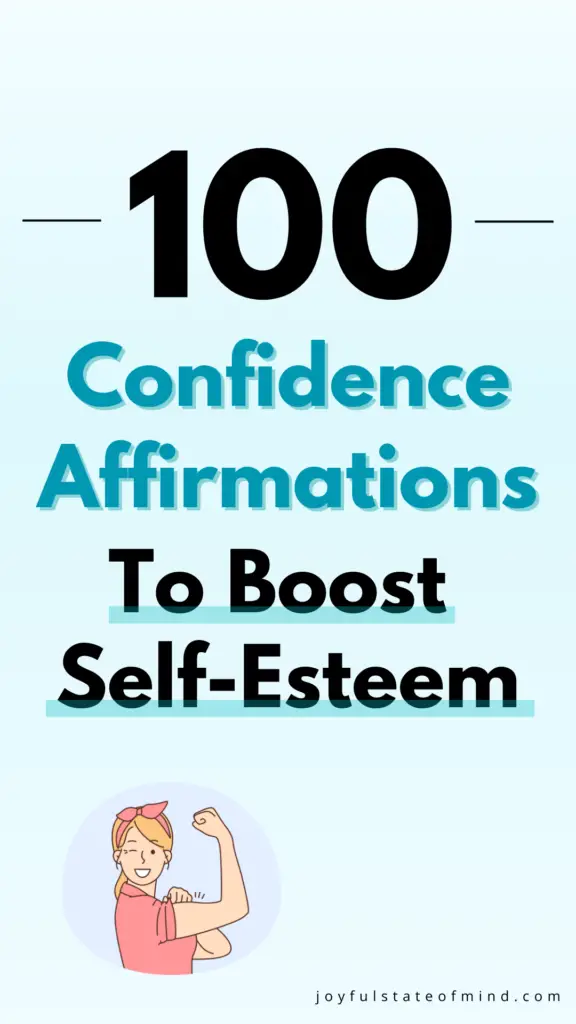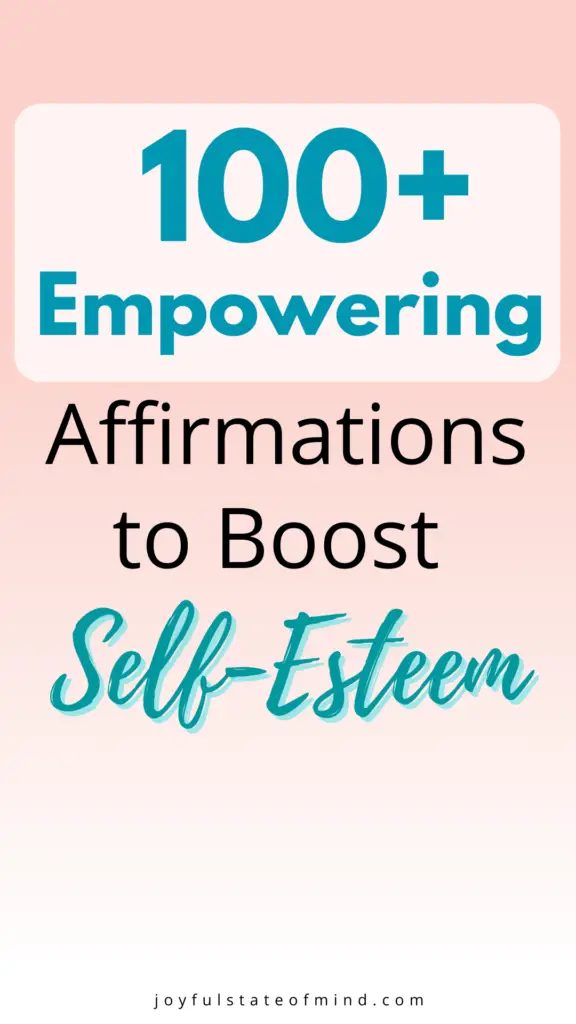100+ Powerful Confidence Affirmations to Boost Self-Esteem

Let’s dive into the realm of self-assurance with 100+ empowering confidence affirmations to boost self-esteem.
So you’re in the right place if you’ve ever found yourself yearning for more confidence.
This post covers what confidence affirmations are, how they work, various ways to practice them, the distinction between confidence and self-esteem and answers frequently asked questions about affirmations to conclude.
This post contains affiliate links, which means I may earn a small commission if you make a purchase, at no cost to you. See my disclaimer for more info.
Trust Your Instincts: Confidence Matters
Your confidence and how you feel about yourself matters. I’ll never forget just before launching this site, I took a few training sessions with a seasoned blogging expert.
During a one-on-one conversation, I expressed my passion for assisting women with self-care and confidence-building. She dismissed the idea saying: “Meh, lacking confidence isn’t something that keeps people up at night.”
She suggested more “lucrative” topics such as weight loss or parenting, deeming them “real issues” easy to monetize. I was initially discouraged, so doubts started creeping in as I went over her words.
But after we ended the call, I thought, wait a second; I know many people are negatively impacted because of their lack of confidence and self-worth. So, I’m glad I trusted my instincts instead of the expert’s advice, and I love researching and writing about these topics for you.
What are Confidence Affirmations
Affirmations are concise, positive statements designed to strengthen your mindset and empower you, for example, “I can do challenging things.”
When you practice using these phrases regularly, you can help make your thinking patterns, attitudes, and actions more positive.
💡Tip: Believing that affirmations can work is essential because if you think they’ll make a difference and are committed to giving them a chance, you’re more likely to experience successful outcomes.
How Do Confidence Affirmations Work and What Do They Do?

Although affirmations aren’t a cure-all, they work in scientifically-backed ways as summarized below, and can do various things to improve your life including transforming negative thoughts, boosting a positive mindset, helping decrease anxiety and stress, and interrupting your overthinking.
Here’s a summary of what they do and how they work:
1. Brain Rewiring and Neuroplasticity
Affirmations help rewire your brain, which is what neuroplasticity is. It’s like giving your brain a workout, helping it form efficient pathways for positive thoughts while reducing the impact of negativity.
Research by Dr. Leaf reveals that repeating positive affirmations supports neuroplasticity—which is your brain’s ability to rearrange itself and build new connections. (1)
So affirmations for self-esteem act as tools for your brain to remodel itself, creating a mental environment that’s more open to positivity.
2. Strategy to Help Combat Anxiety and Depression
Many therapists recommend using affirmations for mental health improvement because it can be an effective self-help strategy. Research highlights the effectiveness of affirmations, such as them helping to address feelings of not being ‘crazy’ and helping you believe in the improvement of depression over time. (2)
Affirmations help reduce anxiety and depression, especially when you have an openness to diverse support and personalized approaches. (3)
💡Tip: Affirmations should align with your core values and be realistic so that you feel connected to the words you’re saying. For example, saying “I will be a millionaire” might do more harm than good; but a balanced, realistic affirmation like “I can make positive changes and succeed in my life” is likely to be more effective.
Related article: Calm Your Mind Now-101 Powerful Affirmations for Anxiety
3. Confidence Affirmations and Stress Reduction
According to certain studies, positive affirmations can also help lower stress by reducing cortisol levels. (4)
Positive affirmations can also help work on the body’s hormone system, helping ensure everything stays balanced, which will lessen the physical impact of stress. (5)
Related article: 58 Ultimate Stress-Relief Affirmations to Restore Calm
4. Helps Stop Overthinking
Positive affirmations help break the cycle of overthinking, which is also known as rumination, and research clearly shows that too much rumination is linked to increased depression and anxiety. (6)
Affirmations also act as an interruption to negative thoughts. Focusing on positive statements helps shift your mind from harmful overthinking since they make you feel more resilient. (7)
5. Self-Affirmation Theory
Self-affirmation theory says when you’re not feeling confident, saying positive things about yourself—like focusing on your strengths—can help you feel better.
A brain scan study found that practicing affirmations activates certain brain areas related to self-reflection and feeling valuable, so this potentially leads to positive behavioural changes. (8, 9)
Self-Confidence Versus Self-Esteem

Self-confidence and self-esteem often get mixed up, which leads people to try to improve things such as their skills or appearance, because they think it will boost self-esteem.
But the truth is, although there are similarities, they’re not the same thing.
So, focusing on one won’t necessarily fix the other, and that’s why I’ve created affirmations specifically for confidence and affirmations for self-esteem.
So let’s look at the difference between the two:
What Is Self-Confidence?
Self-confidence is about being sure of ourselves in specific areas of life, for example being a great painter, baseball player or DIY’er. (10)
It’s that feeling of certainty—whether on stage performing, showcasing work skills, or being a rock star at public speaking. It’s about having trust in our abilities in particular areas.
For example, I’m very confident in my baking skills, but that doesn’t mean I don’t struggle with not feeling worthy in other areas, which brings us to the definition of self-esteem.
Related article: How to Boost Your Confidence as a Woman-8 Quick Fixes
What Is Self-Esteem?
Whereas, self-esteem is how we see ourselves— our sense of personal worth and value. (11)
It’s about accepting who we are, how worthy we feel, and our overall regard for ourselves as human beings. When it’s high, we see ourselves in a positive light; when it’s low, not so much. (12)
For example, when you first begin your career, you may doubt yourself or be too critical of your work, which can lead to lower self-esteem even though you may be confident in other areas of your life.
The great news is that boosting your confidence is completely achievable, and practicing affirmations is a simple tool you can use to start.
So, without further adieu, here are over 100+ powerful affirmations for self-esteem to help boost your self-confidence and increase your self-esteem.

100+ Powerful Confidence Affirmations to Boost Self-Esteem
Affirmations for Self-Confidence
- I am a valuable team player.
- I am a likeable person.
- Today, I will seize life’s opportunities.
- I have a great sense of humour and make people laugh.
- I am confident in my abilities.
- I am actively working on positively transforming my life.
- My determination propels me each day.
- I release myself from self-doubt.
- I define my own success.
- I make the world a better place.
- I seek wisdom.
- I am a creative soul.
- I am a fighter.
- I have conquered so much.
- My friends love me for who I am.
- I choose what I will become.
- I am driven to succeed.
- I am excited about my future.
- I am a prayer warrior.
- My mindset is focused on abundance.
- I’m determined to be the best I can be.
- I have the courage to do hard things.
- I am filled with a sense of purpose.
- I don’t worry about other people’s opinions of me.
- I can find solutions to problems.
- I trust my instincts.
- I am beautifully and wonderfully made.
- I spread positivity to those around me.
- I am proud of how far I’ve come.
- The only person I need to compare myself to is the person I was yesterday.
- When I am weak, God gives me strength.
- I have many skills to be proud of.
- I am a person of worth.
- I make a positive impact on the world.
- I love to see other people thrive.
- My goals are within reach.
- I am in tune with my feelings.
- I love what I do and do what I love.
- I have created healthy boundaries for myself.
- I use my voice to advocate for myself and others.
- I am not afraid to stand up for what’s right.
- Thankfulness fills my heart and mind.
- I am perfect the way I am.
- I can build deep connections with people.
- I’m proud of the woman I’ve become.
- My past helped shape me, so I’m grateful for it.
- I choose faith over fear.
- There’s only one me in this world!
- I am willing to fail and that’s why I succeed.
- My self-compassion has empowered me.
- I have always been more than enough!
- Every day, I become more confident!

Affirmations for Self-Esteem
- I am worthy of my dreams.
- I have everything I need to succeed.
- I believe in myself.
- I am an overcomer.
- I take pride in the work that I do.
- I am capable of handling what comes my way.
- I have the skills to achieve my goals.
- I am a person of value.
- My compassionate heart is my super-power.
- I will be true to myself.
- My mind is open to new adventures.
- I am an insightful person.
- I have good instincts.
- I am worthy of happiness and success.
- I forgive myself for past mistakes.
- I have a family that loves me unconditionally.
- I trust myself to make the right decisions.
- I am a resilient person.
- Each day, I will focus on growth.
- I have flaws like everyone else, and that’s okay.
- I embrace what makes me unique.
- Today, I choose self-love.
- I’m stronger than my fears.
- I choose peace daily.
- My authenticity is a strength.
- I deserve respect.
- Every time I stumble, I get up again.
- I accept and learn from my failures.
- I show myself grace amid adversity.
- I can conquer daily challenges.
- I deserve to experience joy each day.
- I love the person that I’m growing into.
- Each day, I look forward to learning something.
- I will celebrate my achievements, big or small.
- I don’t need validation from others.
- I will accept compliments from others.
- I am so resourceful.
- I do my best each day.
- I am grateful for my blessings.
- I wholeheartedly help others.
- Spreading kindness is one of my superpowers.
- I am full of potential.
- I seek help when needed.
- I choose to surround myself with love.
- I am safe and secure within myself.
- I will not let anyone dull my shine.
- My feelings matter.
- I am inspired by all that is good.
- I will not let other people’s opinions affect me.
- My values guide me, so I don’t waver on them.
- I am ready to face today with courage.
- I am a light to others.
- I fully embrace the person that I am.
7 Ways to Practice Confidence Affirmations for Self-Esteem

If affirmations are new to you or you’ve been sticking to a routine then try mixing it up! Don’t limit them to mornings; you can also tailor them for specific situations.
In Louise Hay’s bestselling book, “You Can Heal Your Life”, she famously suggests adding mirror exercises to your routine, but you can do so much more with them.
Whether a job interview or a tough moment, affirmations for self-esteem are an easy and quick confidence booster. So stay flexible, adapt them to your needs, and let affirmations become a tool for empowerment.
Here are seven ways to practice confidence affirmations:
1. Mirror Affirmations:
The most common practice is saying them aloud in front of a mirror to reinforce positive self-talk and also help build your self-esteem over time.
For example: “I am capable and will tackle challenges as they come.”
2. Gratitude Walk:
A calming mindfulness activity is taking a gratitude walk because it’s a walk where you focus on being fully present and taking in your surroundings with all five senses.
During one of these walks, combine your sense of gratitude with some positive affirmations.
For example: “I am grateful for my health and confident in facing whatever comes my way.”
3. Journaling:
If you’re a fan of journaling, you can also include writing some affirmations in your routine given the fact that it’ll help you develop more empowering beliefs about yourself.
For example: “I believe in my abilities, and each day, I grow stronger.”
4. After a Challenging Day:
This is one I’ve found especially helpful during or after a bad day because it gets me thinking about affirmations focused on my resilience or efforts.
For example: “Today was tough, but I am proud of how I dealt with it.”
5. Pre-Event Affirmations:
This is particularly helpful if you struggle with social anxiety or are an introvert. Use affirmations to increase self-confidence before significant events, interviews, or parties.
For example: “I am well-prepared, and I trust in my abilities to shine in this moment.”
6. Affirmation Cards:
Some people carry positive affirmation cards with uplifting statements so they can refresh their confidence on the go.
For example: “I am deserving of success.”
7. In Replacement of Negative Self-Talk:
I learned this strategy years ago in therapy and use it when negative self-talk and self-doubts start swirling in my mind. In brief, all you need to do is swap your negative thoughts with balanced affirmations to build yourself up in those moments instead of tearing yourself down.
For instance, swap “I can’t do this” with “I am capable, and I’ll give my best.” Instead of saying, “I suck” or “I’m not enough,” say, “I do enough, I have enough, I am enough.”
Most importantly, embrace and forgive yourself for mistakes and always focus on progress, rather than perfection.
💡Tip: To make affirmations more effective, try to recall compliments people have said about you and then write them down. This is part of a Cognitive Behaviour Therapy (CBT) tool called a “thought record” which is designed to help transform your negative thoughts and limiting beliefs into more objective and balanced perspectives about yourself.
Related article: 65 Powerful Self-Love Affirmations
Fun with Confidence Affirmations: Transform Your Daily Routine!
In sum, if you’re open to incorporating affirmations into your routine, they can help shift your life. Think of them as a shield against negativity because they’re helping you build fortitude. Remember, boosting your self-confidence and self-esteem is like a double power-up, so you can use affirmations for both.
But here’s the fun part – affirmations shouldn’t be boring! So make it enjoyable, create your own, and explore the different ways to use them. Moreover, try to look forward to repeating them daily, and then watch how they empower you to face challenges with renewed worth.
There’s no harm in giving them a shot; at the very least, you’ll be reminded of your good qualities and strengths so it’s a win-win!
Affirmations FAQs
1. Do positive affirmations work, and can they change your life?
Positive affirmations may work for some people, but it varies. Research suggests regularly saying positive things about yourself can reduce stress and also improve well-being. (14) However, it also depends on your values and beliefs, how often you do it, and whether the affirmations match your goals. While affirmations can contribute to a more positive mindset, everyone’s experience may differ.
2. How long does it take for affirmations to work?
It depends. The time it takes for affirmations to work varies among people, so some people might notice positive effects relatively quickly, while others may take longer. The effectiveness of affirmations depends on many factors, as discussed above. It’s a gradual process, so patience and regular practice are key.
3. Why do affirmations sometimes not work?
It’s important to note that affirmations are not universally effective for everyone. There are different reasons they might not work.
So let’s look at some possible reasons:
- Using statements inconsistent with your values may not resonate.
- Saying overly positive, unrealistic or exaggerated affirmations can backfire and make you feel worse.
- Expecting immediate or magical results can lead to disappointment.
- If you have discomfort using affirmations, that can also impede their effectiveness.
4. How can I create my own affirmations?
Creating affirmations is simple and something I highly recommend! First, focus on positive and present-tense statements about yourself or your goals. Be specific and use words that resonate with you. Think about areas where you want to boost confidence or make changes. For example, if you want to improve self-esteem, say, “I am worthy and deserving of success.”

References:
1. Neuroplasticity: What It Is & How to Harness Its Power for Your Benefi – Dr. Leaf
2. Attributions and affirmations for overcoming anxiety and depression – Kinnier – 2009 – Psychology and Psychotherapy: Theory, Research and Practice – Wiley Online Library
3. Same as above.
4. Neural mechanisms of self-affirmation’s stress buffering effects | Social Cognitive and Affective Neuroscience | Oxford Academic
5. Same as above.
6. Rumination as a Mechanism Linking Stressful Life Events to Symptoms of Depression and Anxiety: Longitudinal Evidence in Early Adolescents and Adults – PMC
7. The cessation of rumination through self-affirmation.
8. Self-affirmation activates brain systems associated with self-related processing and reward and is reinforced by future orientation
9. Same as above.
10. Are Self-Confidence and Self-Esteem the Same Thing? | Psychology Today Canada
11. Self-Esteem: Influences, Traits, and How to Improve It
12. Are Self-Confidence and Self-Esteem the Same Thing? | Psychology Today Canada
13. How To Use CBT Thought Records To Change The Way You Feel
14. Affirmation of personal values buffers neuroendocrine and psychological stress responses






I think affirmations can really help, but it can be hard to feel comfortable saying them at first, so consistency is really important. This is such a great list! I like the idea of taking positive things people have said to you and using those!
Jill – Doused in Pink